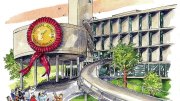1919
Alice Hamilton is appointed assistant professor of industrial medicine, becoming the first woman to hold a professorial position at the University.
1939
A negotiated agreement on raises ends the threat of a strike by dining hall workers, and the American Federation of Labor is recognized as their sole bargaining agent.
1944
Between matinees at the RKO Theatre in Boston, Duke Ellington visits Harvard to discuss “Negro Music in America” before a crowd in Paine Hall, and then treats the audience to a medley that includes “Don’t Get Around Much Anymore” and “Mood Indigo.”
1959
Radcliffe’s weekly paper, Percussion, has sponsored a fashion contest to pick the best-dressed Radcliffe girl, who will enter a national contest sponsored by a fashion magazine. Barnard and Moors Halls voted not to participate, calling the contest “against Radcliffe’s principles.”
1964
Sixteen predominantly Negro colleges have been invited to send one student each (preferably a junior contemplating graduate study) to Harvard’s summer school on scholarships “to [enable] the students to attend a cosmopolitan, integrated university to test their ability for…and interest in” graduate work.
1974
A $200 increase in tuition and a $125 increase in room-and-board rates raise the cost of a Harvard-Radcliffe education to $5,350.
1979
Sixteen-year-old Carpenter Center, the only building in North America designed by the Swiss architect Le Corbusier, has won a listing in the National Register of Historic Places. (The Center celebrated its sixtieth anniversary in 2023.)
1984
The Business School has announced that M.B.A. students will be required to use portable IBM personal computers as part of regular class preparation, and the Expository Writing program is offering an experimental section in which the papers are written and critiqued on computers on loan from IBM.









